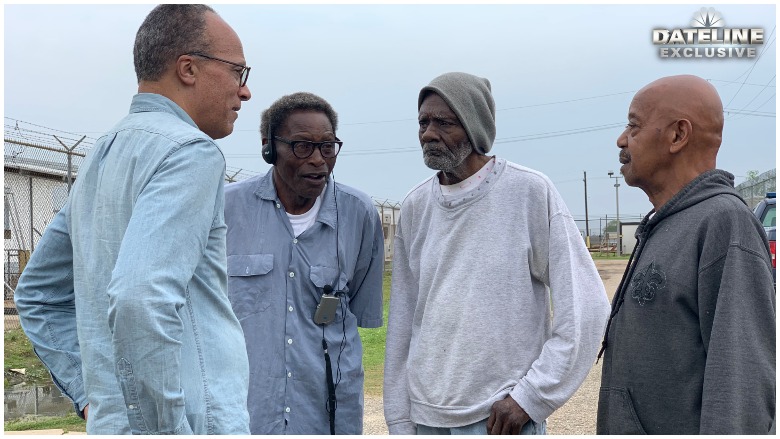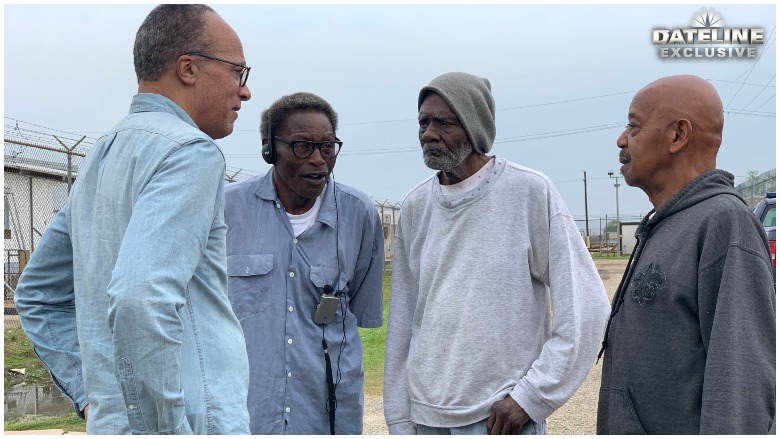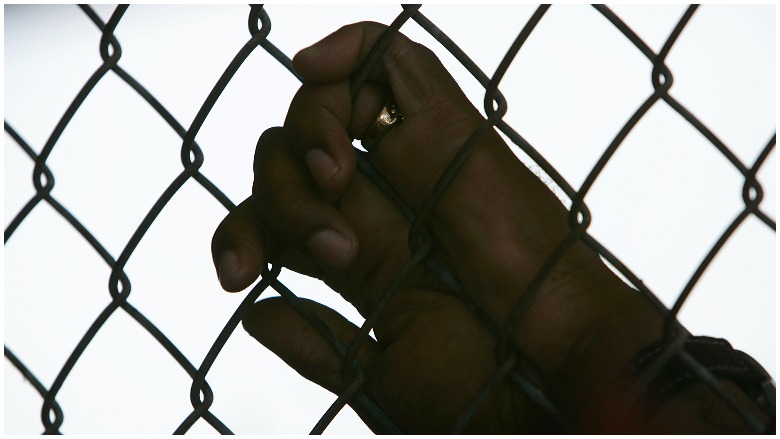
NBC News Lester Holt speaks with inmates at Louisiana State Penitentiary. From left are Henry Montgomery, Sammie Robinson and Clifford Hampton.
Sammie Robinson is the longest serving inmate at Louisiana State Penitentiary, also called Angola. He was incarcerated when he was just 16 in 1953.
He was incarcerated after he was convicted of aggravated rape. That case was overturned because he was not told he had the right to an attorney, according to a 1970 newspaper article from The Times in Shreveport. However, between the time of his conviction and the time that conviction was overturned, he murdered an inmate. Robinson was sentenced to life in prison for second degree murder, according to court documents filed in his case.
Robinson is among a growing population of elderly inmates at the Angola Prison. A lawsuit is pending, which alleges inmates are facing “cruel and unusual punishment” at the prison and receiving “grossly negligent” medical care.
Robinson is featured on the first episode of Dateline NBC’s series, “Justice for All,” which airs at 10/9C Friday, September 6, 2019. On the first episode, Lester Holt spent two days behind bars at the prison, which was once called “the bloodiest prison in the world.” You can read more about the prison here. During his time at Angola, Holt spoke with inmates about their lives and their time behind bars. He also interviewed Javonte Sanders, who was sentenced to life in prison for murdering the mother of his childhood friend. Sanders is one of many inmates assigned to work in the fields on a former slave plantation. You can read more about Sanders, his case and his background here.
Robinson told Holt he has no one on the outside, and no one comes to visit him. He said he wants to be free, and that he is not a threat to society.
Here’s what you need to know:
1. Robinson Has Spent His Entire Adult Life Behind Bars, Starting When He Was Just 16

NBC NewsLester Holt speaks with inmates at Louisiana State Penitentiary. From left are Henry Montgomery, Sammie Robinson and Clifford Hampton.
Robinson first entered the Angola prison when he was only 16 years old. He was convicted of aggravated rape, but that conviction would later be overturned. Robinson is one of many “juvenile lifers” in the prison system. In 22 states and the District of Columbia, sentencing a juvenile to life without parole is banned, according to The Sentencing Project. However, Robinson was not sentenced to life when he was a juvenile. He was sentenced to 15 years in prison for aggravated rape, and sentenced to life for murdering an inmate.
“How old were you when you came here?” Holt asked Robinson in an interview.
“16, going on 17,” Robinson answered.
“You were just a teenager,” Holt answered.
Robinson said he is 83 now. He does not have anyone on the outside, and he never gets visitors.
“Do you want to get out of here?” Holt asked.
“Definitely. I’ve been here all my life, ever since I was a kid,” Robinson answered.
2. Robinson Is 83 Years Old, Incarcerated in a Prison With ‘Grossly Negligent’ Medical Care, a Lawsuit Alleges

GettyAn inmate at the Louisiana State Penitentiary grasps a fence at the prison.
Robinson has reached an age where many people are in need of frequent medical care, supervision and help completing basic daily tasks. But Robinson is behind bars, and he is incarcerated at a prison which is being sued on allegations of “grossly negligent” medical care.
The results of the lawsuit are pending negotiations between the attorneys representing the inmates and a Baton Rouge federal magistrate. The class-action lawsuit was filed in 2015. The Advocate reported the parties met July 30, 2019, with hopes to settle. An agreement could not be reached. The lawsuit alleges that medical care became worse after The Earl K. Long Medical Center in Baton Rouge closed in 2013. The hospital treated inmates with medical emergencies. The lawsuit claims inmates face “abysmal” conditions and “cruel and unusual punishment” at Angola prison.
The prison has a large population of elderly inmates, many of whom suffer from chronic diseases.
The Louisiana Judicial College completed a study five years ago of the aging population of inmates within the state prison system in Louisiana. Robinson, then 77, was listed as a low risk. The study cataloged 1,098 inmates over age 55 in local facilities and 2,690 inmates over age 55 in state facilities, including Robinson.
3. Robinson’s Conviction Was Overturned, But He Murdered an Inmate in Prison
Robinson was first sent to the Angola Prison at age 16 in 1953 because he was convicted of aggravated rape. The conviction carried a 15-year sentence. In September 1970, his conviction was vacated by Ninth Judicial District Judge Field V. Gremillion, according to a newspaper article from The Times in Shreveport.
“Gremillion ruled that Robinson was not represented by counsel, the court did not inform him of his right to counsel nor appoint counsel, and that he did not waive his right to counsel,” the article said. “The ruling setting aside the conviction was rendered following a hearing on a petition for a writ of habeas corpus.
While Robinson was behind bars, serving time for a conviction that was later found to violate his Constitutional rights, he murdered an inmate in prison in 1957. He was convicted of second-degree murder and sentenced to life in prison.
“However, Robinson reportedly is serving a life term in the Louisiana State penitentiary at Angola for a murder allegedly committed while in prison,” the article said.
4. Robinson Appealed the Murder Case, But His Appeal Was Denied in 2018
Robinson appealed the conviction on his second-degree murder case, but his appeal was denied because it was not filed in time, court documents said. He has exhausted all of his appeals unless his case fits specific perimeters that would cause the state to re-examine his case.
“Denied,” the opinion written in response to the appeal said. “The application was not timely filed in the district court, and relator fails to carry his burden to show that an exception applies.”
It goes on to say, “Hereafter, unless he can show that one of the narrow exceptions authorizing the filing of a successive application applies, relator has exhausted his right to state collateral review. The district court is ordered to record a minute entry consistent with this per curiam.”
You can read the opinion here.
5. Robinson Participated in a Study About ‘Male Code’ at Louisiana State Penitentiary
Robinson participated in a study published in 2015, written by Liam Kennedy, who holds a Ph.D. in Sociology from the University of Toronto. It is called, “‘He Must Learn What Being a Man is All About: Negotiating the Male Code at the Louisiana State Penitentiary.” You can read it here.
The abstract says,”Much of what has been written about masculinities inside prisons focuses on the pressure to live up to a hypermasculine ideal that privileges aggression, the concealment of vulnerability, and the victimization of weaker inmates. Believing this approach lacks nuance, I explore how prisoners writing in The Angolite, the Louisiana State Penitentiary’s prison newsmagazine, conceive of manhood. Incorporating hundreds of men’s voices into this discussion reveals the complexity of these prisoners’ lives as men—their emotional depth, friendships, and struggles to grow, learn, and better themselves—and compels us to reconsider what we think goes on inside prisons.”
READ NEXT: Louisiana State Penitentiary ‘Angola’: 5 Fast Facts You Need to Know
